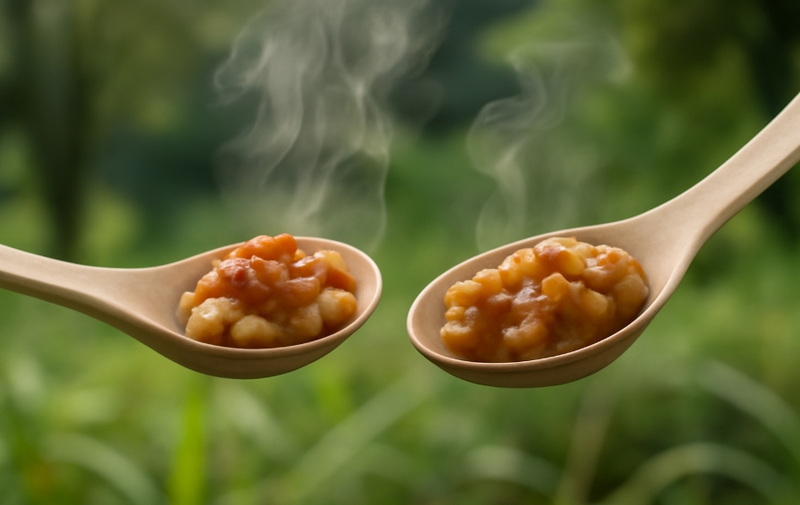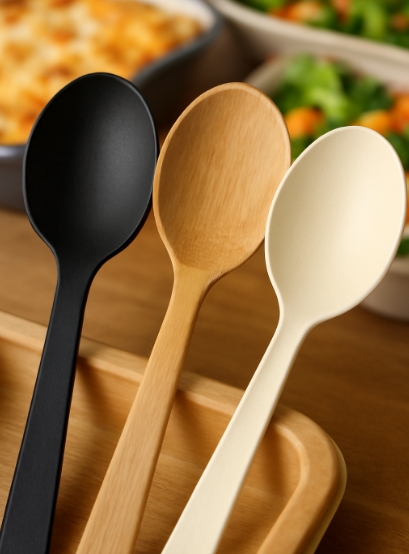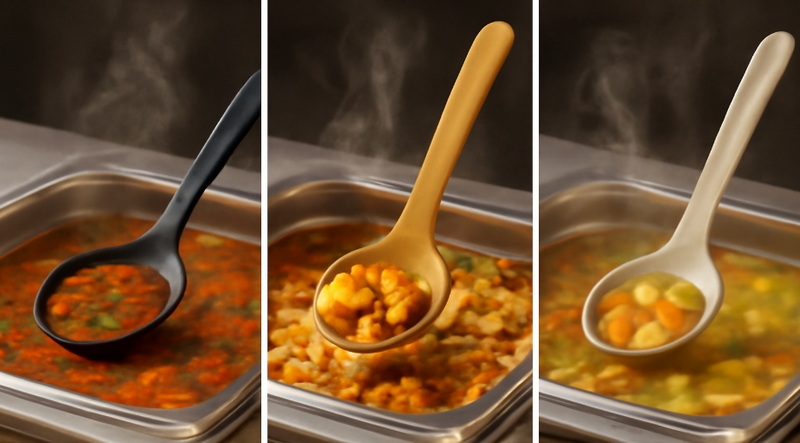
Content Menu
● Understanding Disposable Serving Spoons
>> What Are Disposable Serving Spoons?
>> Common Materials Used
● The Science of Heat Resistance
>> Heat Resistance in Plastic Serving Spoons
>> Bamboo and Plant Fiber Alternatives
>> Paperboard and Eco-Friendly Options
● Real-World Performance: Can Disposable Serving Spoons Handle Hot Food?
>> Plastic Serving Spoons in Action
>> Bamboo and Compostable Spoons
>> Heat-Resistant Plastic Spoons
● Factors Affecting Sturdiness and Heat Resistance
>> Material Thickness and Design
>> Quality of Manufacturing
>> Intended Use and Portion Size
● Safety Considerations
>> Food-Grade Materials
>> Avoiding Melting and Warping
● Eco-Friendly and Sustainable Choices
>> Compostable and Biodegradable Options
>> Reusability and Recycling
● Practical Tips for Choosing the Right Serving Spoon Disposable
● Conclusion
● FAQ
>> 1. Are all disposable serving spoons suitable for hot food?
>> 2. What is the best material for a serving spoon disposable when serving hot dishes?
>> 3. Can I reuse disposable serving spoons?
>> 4. Are compostable serving spoons as sturdy as plastic ones for hot food?
>> 5. How do I ensure the serving spoon disposable I choose is safe for hot food?
Disposable serving spoons have become essential tools in the world of catering, events, and casual gatherings. Their convenience, affordability, and adaptability make them a go-to choice for serving everything from fresh salads to piping hot entrees. However, a question often arises: Are disposable serving spoons sturdy enough for hot food? In this in-depth exploration, we'll examine the materials, design, heat resistance, and real-world performance of serving spoon disposable options. By the end, you'll have a clear understanding of whether these utensils can stand up to the demands of serving hot dishes, and how to select the best option for your needs.

Understanding Disposable Serving Spoons
What Are Disposable Serving Spoons?
Disposable serving spoons are single-use utensils designed for serving food at events, buffets, catering functions, and casual gatherings. They are typically made from materials such as plastic, bamboo, or compostable plant fibers. The main advantage of a serving spoon disposable is convenience-no need for washing up after use, which saves time and effort, especially when serving large groups.
Common Materials Used
- Plastic (Polypropylene, Polystyrene, Heat-Resistant Plastics)
- Bamboo
- Compostable Plant Fibers
- Paperboard (Eco-friendly options)
Each material offers unique benefits and limitations, particularly regarding their ability to withstand high temperatures.
The Science of Heat Resistance
Heat Resistance in Plastic Serving Spoons
Not all plastic serving spoons are created equal. The sturdiness and heat resistance of a serving spoon disposable depend largely on the type of plastic used. High-quality, heat-resistant plastics such as polypropylene or specially engineered blends can withstand temperatures well above those encountered in most food service settings. These spoons are designed to maintain their structural integrity without melting, warping, or leaching chemicals into food when exposed to hot dishes.
Bamboo and Plant Fiber Alternatives
Bamboo and plant fiber serving spoons are naturally heat-resistant and do not warp or break down when used with hot foods. Bamboo, in particular, is known for its strength and durability, making it a reliable option for serving everything from pasta to hot casseroles. Compostable plant fiber spoons are also engineered to handle hot food without losing their shape or strength.
Paperboard and Eco-Friendly Options
Innovative paperboard serving spoons, such as those from eco-conscious brands, are surprisingly sturdy and can handle both cold and hot foods, including thick soups and chili. These options are often chosen for their eco-friendliness and compostability.
Real-World Performance: Can Disposable Serving Spoons Handle Hot Food?
Plastic Serving Spoons in Action
Catering professionals and event planners frequently rely on heavy-duty plastic serving spoons for serving hot foods. Experiences from users consistently highlight that premium serving spoon disposable options made from thick, sturdy plastic do not bend, snap, or warp when used with hot dishes such as pasta, sauces, and even soups. These utensils are specifically designed to provide enough strength and a comfortable grip, ensuring that serving hot food is both safe and efficient.
Bamboo and Compostable Spoons
Disposable bamboo serving spoons are praised for their durability and ability to handle hot foods just as effectively as their plastic counterparts. Compostable plant fiber spoons are also robust, offering a sustainable solution without sacrificing performance.
Heat-Resistant Plastic Spoons
For situations involving extremely hot foods, such as freshly cooked soups or stews, heat-resistant plastic serving spoons are the best choice. These spoons are manufactured to withstand high temperatures, ensuring they do not deform or melt during use. This makes them suitable for both commercial and home settings where safety and reliability are paramount.
Factors Affecting Sturdiness and Heat Resistance
Material Thickness and Design
The thickness and design of a serving spoon disposable play a crucial role in its sturdiness. Thicker spoons with reinforced handles are less likely to bend or break, even when serving dense or heavy hot foods. Some models feature ergonomic or contoured handles for added comfort and control.
Quality of Manufacturing
Premium brands invest in higher-quality materials and manufacturing processes, resulting in spoons that are both heat-resistant and durable. Cheaper options may use thinner plastics that are prone to warping or snapping under stress, especially when exposed to heat.
Intended Use and Portion Size
Serving spoons designed for large portions or heavy foods are generally more robust. When selecting a serving spoon disposable, consider the types of dishes you'll be serving and choose a spoon with an appropriate size and strength.

Safety Considerations
Food-Grade Materials
Always ensure that your serving spoon disposable is made from food-grade, BPA-free, and non-toxic materials. This is especially important when serving hot foods, as lower-quality plastics may leach harmful chemicals when exposed to heat.
Avoiding Melting and Warping
Using spoons not intended for high temperatures can result in melting, warping, or even contamination of food. Always check the manufacturer's specifications regarding maximum temperature tolerance before using any disposable spoon for hot dishes.
Eco-Friendly and Sustainable Choices
Compostable and Biodegradable Options
The growing demand for sustainable serving solutions has led to the development of compostable and biodegradable serving spoon disposable options. Made from bamboo, plant fibers, or paperboard, these spoons offer excellent sturdiness and heat resistance while minimizing environmental impact.
Reusability and Recycling
Some high-quality disposable spoons are designed to be washed and reused multiple times, further reducing waste. Additionally, many are recyclable, provided local facilities accept the specific material.
Practical Tips for Choosing the Right Serving Spoon Disposable
- Match Material to Food Temperature: For hot foods, select heat-resistant plastic, bamboo, or plant fiber spoons.
- Evaluate Sturdiness: Choose thicker, reinforced designs for heavy or dense foods.
- Prioritize Safety: Ensure all materials are food-grade and free from harmful chemicals.
- Consider Sustainability: Opt for compostable or recyclable spoons when possible.
- Check Manufacturer Guidelines: Always follow recommendations regarding temperature limits and safe use.
Conclusion
Disposable serving spoons, when chosen wisely, are indeed sturdy enough for hot food. High-quality plastic, bamboo, and plant fiber options are specifically engineered to withstand the rigors of serving hot dishes without bending, melting, or leaching chemicals. The key is to select the right material and design for your needs, prioritize safety, and consider sustainability. Whether you're planning a large catered event or a small family gathering, there is a serving spoon disposable that can handle the heat-literally and figuratively.

FAQ
1. Are all disposable serving spoons suitable for hot food?
Not all disposable serving spoons are suitable for hot food. Only those made from heat-resistant plastic, bamboo, or plant fibers are designed to withstand high temperatures without warping or melting. Always check the product specifications before use.
2. What is the best material for a serving spoon disposable when serving hot dishes?
Heat-resistant plastic (such as polypropylene), bamboo, and plant fiber are the best materials for serving hot dishes. These materials maintain their strength and integrity even when exposed to high temperatures.
3. Can I reuse disposable serving spoons?
Some high-quality disposable serving spoons, especially those made from durable plastic or bamboo, can be washed and reused several times. However, always check the manufacturer's recommendations, as some are intended strictly for single use.
4. Are compostable serving spoons as sturdy as plastic ones for hot food?
Yes, many compostable serving spoons made from plant fibers or bamboo are just as sturdy and heat-resistant as their plastic counterparts. They offer a sustainable alternative without compromising performance.
5. How do I ensure the serving spoon disposable I choose is safe for hot food?
Look for spoons labeled as heat-resistant, food-grade, and BPA-free. Check the maximum temperature rating provided by the manufacturer and select spoons from reputable brands to ensure safety and reliability.

















